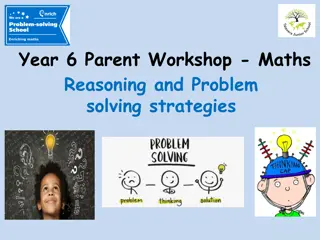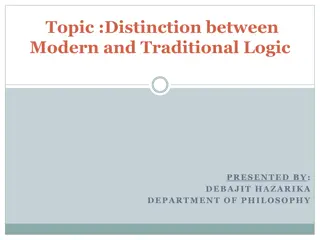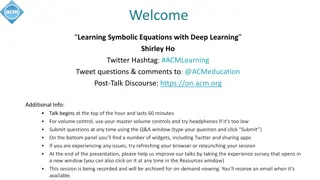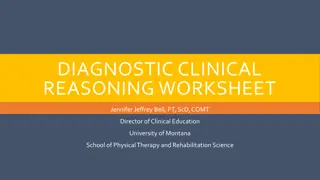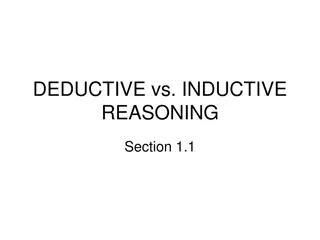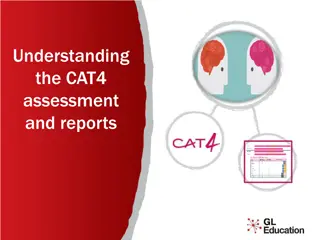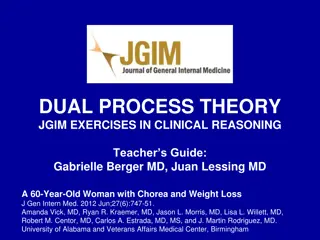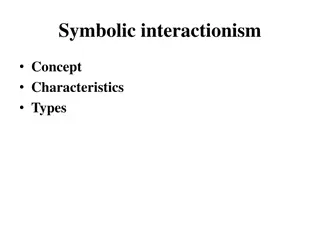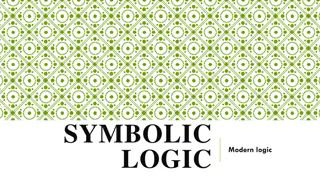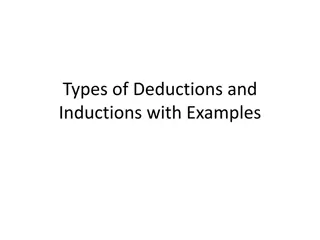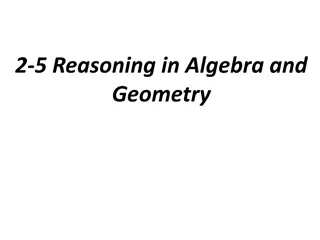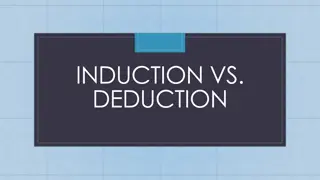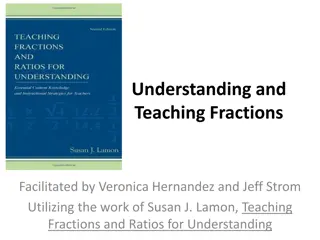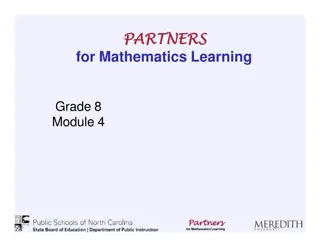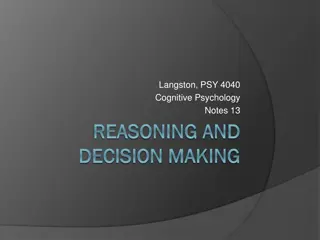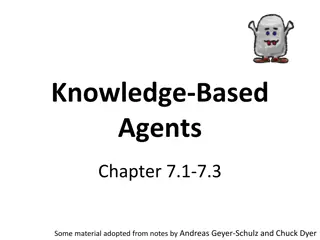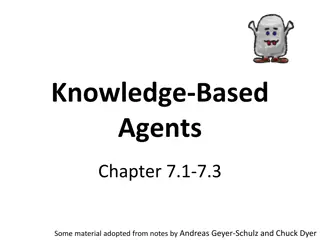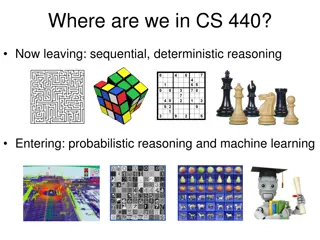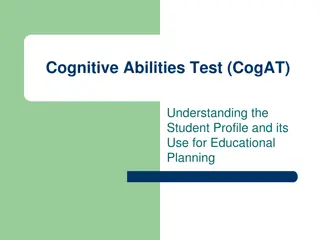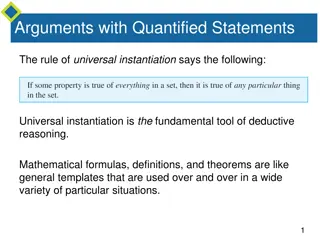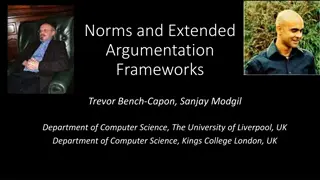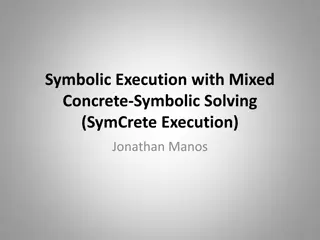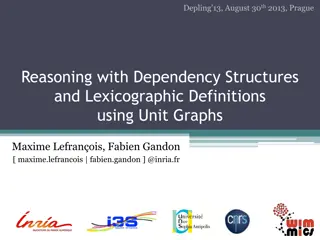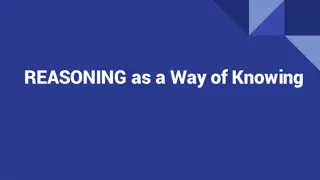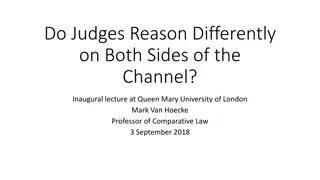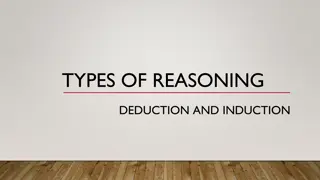Enhancing Math Skills for Year 6 Students Through Reasoning and Problem-Solving
Explore the shift towards math mastery, reasoning, and problem-solving strategies in Year 6 parent workshops. Learn why these methods differ from traditional approaches, emphasizing understanding over rote memorization. Discover the key skills needed for mathematical reasoning and how to support you
0 views • 23 slides
Understanding Inductive and Deductive Reasoning
Inductive reasoning involves drawing general conclusions from specific observations, while deductive reasoning starts with general premises to derive specific conclusions. Induction uses experience or experimental evidence to make broad conclusions, while deduction follows from general to specific.
5 views • 7 slides
Topic : Distinction between Modern and Traditional Logic.
Logic, as a normative study, focuses on distinguishing correct reasoning from incorrect. Traditional logic, based on Aristotle's work, emphasized syllogistic reasoning, while modern logic, pioneered by figures like Leibnitz and Russell, employs mathematical methods and symbolic logic for a more adva
2 views • 10 slides
Exploring Symbolic Equations with Deep Learning by Shirley Ho at ACM Learning Event
Join Shirley Ho at the ACM Learning event to delve into the world of symbolic equations with deep learning. Discover insights on leveraging deep learning for symbolic equations and engage in a knowledge-packed session tailored for scientists, programmers, designers, and managers.
0 views • 5 slides
Decoding Symbolic Thinking: Exploring the Power of Symbols in Learning and Perception
Delve into the world of symbolic thinking through the eyes of renowned artist René Magritte and explore how symbols shape our perception and understanding of the world. From dissecting Magritte's iconic painting to unraveling the intricacies of language as a symbolic system, journey through the int
2 views • 15 slides
Clinical Reasoning Worksheet for Differential Diagnoses
A Diagnostic Clinical Reasoning Worksheet created by Jennifer Jeffrey Bell, PT, ScD, COMT, to guide students through the diagnostic process, enhancing their clinical reasoning skills. The worksheet helps in selecting appropriate diagnoses based on patient demographics, describing patient presentatio
0 views • 9 slides
Understanding Deductive Reasoning and Problem Solving in Logic
Explore the concepts of deductive reasoning, problem-solving logic, and Venn diagrams in this informative content. Learn about the process of drawing conclusions from known facts, using syllogisms to make valid arguments, and understanding the difference between truth and validity in deductive reaso
7 views • 16 slides
Understanding the CAT4 Assessment and Reports
CAT4, the Cognitive Abilities Test Fourth Edition, assesses students' abilities in verbal, quantitative, non-verbal, and spatial reasoning. It distinguishes between ability and attainment testing and is used to identify academic potential, understand student thinking, determine support needs, highli
1 views • 15 slides
Dual Process Theory in Clinical Reasoning: A Case Study Analysis
Understanding dual process theory in clinical reasoning is crucial for healthcare professionals. This case study delves into the application of System 1 and System 2 thinking in diagnosing a 60-year-old woman presenting with chorea and weight loss. System 1 involves intuitive, quick decision-making
2 views • 24 slides
Understanding Symbolic Interactionism in Sociology
Symbolic Interactionism is a school of thought in sociology that focuses on how individuals interact with each other through symbols, shaping social structures. It highlights the role of symbols in defining actions and meanings in social interactions. The concept explores how different socializing e
0 views • 18 slides
Understanding Bayesian Reasoning: A Comprehensive Overview
Bayesian reasoning involves utilizing probabilities to make inferences and decisions in the face of uncertainty. This approach allows for causal reasoning, decision-making under uncertainty, and prediction based on available evidence. The concept of Bayesian Belief Networks is explored, along with t
1 views • 33 slides
Understanding Sociological Perspectives
Sociologists employ three primary theoretical perspectives to explain how society influences young people and vice versa: the symbolic interactionist perspective, the functionalist perspective, and the conflict perspective. Symbolic interactionism focuses on symbols and face-to-face interactions, wh
1 views • 18 slides
Understanding Symbolic Logic: A Modern Approach
Delve into the world of symbolic logic where traditional and modern approaches differ. Learn how symbolic languages help overcome challenges with natural languages, leading to a clearer understanding of deductive reasoning through the analysis of premises, conclusions, compound statements, and logic
1 views • 32 slides
Understanding Propositional Logic at Kwame Nkrumah University
Dive into the world of symbolic logic and compound statements with a focus on Propositional Logic at Kwame Nkrumah University in Ghana. Explore the concepts of connectives, simple and compound statements, truth values, and more. Enhance your logical reasoning skills through a tutorial on symbolic lo
0 views • 57 slides
Enhancing Clinical Reasoning Training in Medical Education
Integrating research activities into educational programs is essential for advancing clinical reasoning training in medical education. This study explores different teaching approaches for clinical reasoning, focusing on addressing traditional teaching drawbacks and implementing simulation encounter
0 views • 31 slides
Understanding Deductive and Inductive Reasoning
Explore the world of deductive and inductive arguments through examples of deductive reasoning based on definitions and math, including categorical syllogisms, hypothetical syllogisms, and disjunctive syllogisms. Delve into inductive reasoning and the key distinctions between deductive and inductive
0 views • 26 slides
Understanding Laws of Logic and Logical Reasoning
Laws of logic play a crucial role in reasoning and making deductions. This comprehensive guide explains the use of contrapositives, examples of conditional statements, and the significance of laws like the Law of Syllogism. Understanding these principles helps in effectively analyzing statements and
0 views • 8 slides
Introduction to Symbolic Logic: Understanding Logical Inferences
Logic is the study of reasoning methods to distinguish between correct and incorrect arguments. Symbolic Logic involves representing logic symbolically for easier understanding and manipulation. Logical inferences help in making decisions based on reasoning chains. The content discusses the use of l
1 views • 28 slides
Algebra and Geometry Reasoning: Concepts and Proofs
Explore key concepts in algebra and geometry reasoning, including properties of equality, distributive property, and proofs using deductive reasoning. Practice solving equations, identifying properties of congruence, and writing two-column proofs to justify mathematical statements.
0 views • 13 slides
Understanding Deductive and Inductive Reasoning in Problem-Solving
Explore the differences between deduction and induction in problem-solving approaches. Deductive reasoning starts with a general statement and moves to specifics, offering certainty and objectivity, while inductive reasoning begins with specifics and arrives at a generalization, providing flexibilit
0 views • 11 slides
Mastering Fractional and Proportional Reasoning Workshop
Dive into the world of fractions and proportions in this workshop facilitated by Veronica Hernandez and Jeff Strom, based on the work of Susan J. Lamon. Explore critical components like units, equivalence, comparison techniques, and fraction sense, without relying on traditional rules. Embrace reaso
0 views • 40 slides
Exploring Proportional Reasoning in Grade 8 Mathematics Learning
Dive into the world of proportional reasoning in Grade 8 mathematics with a focus on identifying better buys, strategies for decision-making, and the importance of developing proportional thinking skills. Discover the significance of proportional reasoning as a key element in the curriculum, its imp
0 views • 55 slides
Understanding Reasoning and Decision-Making in Cognitive Psychology
Exploring the intricacies of reasoning, decision-making, and logic in cognitive psychology, this content delves into how humans process information, make choices based on heuristics, and struggle with understanding probability. The challenges in conditional reasoning are highlighted through examples
0 views • 79 slides
Understanding Legal Reasoning: A Comprehensive Insight
Legal reasoning involves navigating through gaps, inconsistencies, and ambiguities in the law to interpret and apply legal norms effectively. This process of validation, interpretation, and application helps legal practitioners optimize the legal system and adapt it to real-life cases. The presentat
0 views • 21 slides
Introduction to Code Reasoning in CSE331 Lecture
In this lecture, we delve into the fundamentals of code reasoning, focusing on forward and backward reasoning techniques in straight-line and if-statement code. The session includes reviewing the practice of identifying the strongest assertions and understanding the dual purposes of proving code cor
0 views • 24 slides
Understanding Knowledge-Based Agents and Logical Reasoning
Knowledge-based agents utilize logic for problem-solving, drawing conclusions from data. People employ various reasoning strategies, including fast and slow thinking processes. Explore the application of logic in inference and decision-making, as well as the challenges of human logical reasoning.
0 views • 56 slides
Understanding Logic and Reasoning in Knowledge-Based Agents
Drawing reasonable conclusions from data is essential for intelligence. Logic is a powerful tool used by both people and computers. While humans possess logical inference abilities, they may struggle with certain types of reasoning. The book "Thinking, Fast and Slow" explores the dual systems of hum
0 views • 58 slides
Introduction to Probabilistic Reasoning and Machine Learning in CS440
Transitioning from sequential, deterministic reasoning, CS440 now delves into probabilistic reasoning and machine learning. The course covers key concepts in probability, motivates the use of probability in decision making under uncertainty, and discusses planning scenarios with probabilistic elemen
0 views • 42 slides
Enhancing Online Service Security through Symbolic Transaction Certification
The research discusses securing multiparty online services through the certification of symbolic transactions, addressing logic flaws and the importance of program verification. The Certification of Symbolic Transaction (CST) approach is presented as an effective way to verify system-wide properties
0 views • 22 slides
Introduction to Logical Thinking in Computer Science at VSB - Technical University of Ostrava
This course introduces the concept of logical thinking in Computer Science at VSB - Technical University of Ostrava. Topics include valid arguments, deductive reasoning, and the science of correct reasoning. Requirements for passing the course include written tests and exams with specified grade ran
0 views • 18 slides
Understanding Cognitive Abilities Test (CogAT) for Educational Planning
The Cognitive Abilities Test (CogAT) is a benchmark test administered to third-grade students in the WCPSS for educational planning. The test measures verbal reasoning, math reasoning, and visual-spatial reasoning skills through different subtests and composite scores. These scores help in predictin
0 views • 17 slides
Understanding Universal Instantiation in Deductive Reasoning
Universal instantiation is a crucial tool in deductive reasoning, allowing us to derive specific conclusions from general statements. By combining universal instantiation with modus ponens and modus tollens, we can construct valid arguments such as universal modus ponens and universal modus tollens.
0 views • 13 slides
Norms and Practical Reasoning Frameworks in Value-Based Argumentation
Norms play a crucial role in influencing behavior through practical reasoning. Practical reasoning involves using value-based argumentation frameworks to generate and evaluate arguments, as demonstrated in the parable of the Ant and the Grasshopper. The story highlights the importance of planning fo
0 views • 15 slides
Understanding Symbolic Execution and Directed Automated Random Testing
Symbolic Execution is a method used for analyzing programs to determine inputs causing each part to execute, vital in program testing. However, limitations arise in cases without code availability, hindering definitive path conditions. Directed Automated Random Testing (DART) overcomes this through
0 views • 20 slides
Enhancing Proportional Reasoning in Online Discourse for Middle School Students
The research focused on supporting middle school students in developing proportional reasoning skills in an online setting. Techniques such as breakout rooms, notice and wonder routine, silent thumbs ups, and prompting student-student interaction were utilized to foster meaningful online discourse.
0 views • 10 slides
Reasoning with Dependency Structures and Lexicographic Definitions using Unit Graphs
This piece discusses the application of knowledge representation in addressing recurrent needs related to manipulating, querying, reasoning, and sharing information, particularly in the linguistic domain of Meaning-Text Theory. Maxime Lefrançois and Fabien Gandon explore formalisms, such as the the
0 views • 56 slides
Exploring Reasoning as a Method of Knowledge Acquisition
Reasoning serves as a fundamental way of knowing, enabling individuals to transcend immediate experiences, build knowledge, and evaluate beliefs. This process involves the application of logic, examining the interplay between beliefs, ideas, and truth. By integrating reason with imagination, individ
0 views • 37 slides
Contrasting Legal Reasoning in Common Law and Continental Law Systems
This inaugural lecture explores the differences in legal reasoning between judges on both sides of the English Channel. It delves into the declaratory theory of decision-making in Common Law and the application of legislative intent in Continental Law. The lecture also touches on the contrasting ind
0 views • 48 slides
TYPES OF REASONING DEDUCTION AND INDUCTION
Reasoning involves a connected sequence of thoughts leading to a conclusion. Deductive reasoning moves from general to specific, identifying assumptions and hidden premises. Categorical syllogisms demonstrate valid and sound argument structures, while real-life arguments may require uncovering assum
0 views • 21 slides
Forms of Moral Reasoning and Ethics in Decision-Making
Explore the main forms of moral reasoning in ethical decision-making, including virtue ethics, deontological reasoning, and teleological reasoning. Understand the importance of developing ethical virtues and principles in guiding behavior. Delve into examples of reasoning from virtue and deontologic
0 views • 28 slides
